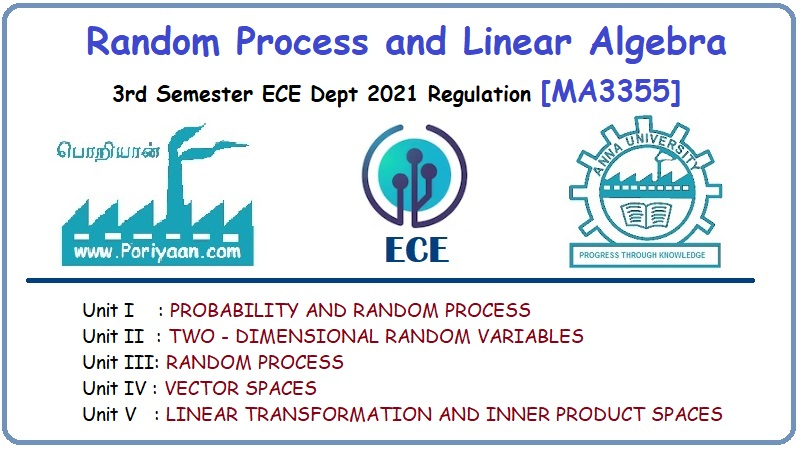Random Process and Linear Algebra: Unit III: Random Processes,,
Markov Process
"If the future value depends only on the present state but not on the past states is called a Markov process". X1, X2, ..., Xn-1, Xn are known as the states of the process, by our definition "future state Xn+1" depends only on "present state Xn", but not on "past states X1, X2, X3, ..., Xn-1
MARKOV
PROCESS
Definition: Markov Process [A.U A/M 2015 (RP) R-8]
A random process X(t)
is said to be Markov process, if

(OR)
"If the future
value depends only on the present
state but not on the past states is
called a Markov process".
Note:
X1, X2, ..., Xn-1, Xn are known as
the states of the process, by our definition "future state Xn+1" depends only on "present state Xn", but
not on "past states X1, X2, X3, ..., Xn-1
Example: Markov Process
1. The probability of
raining today depends only on previous weather conditions existed for the last
two days and not on past weather conditions.
2. A first-order linear
differential or difference equation is Markovian.
3. Weather prediction
models
Classification of Markov Process
A Markov process can be
classified into four types, based on the values taken by time t and the state
space {Xi}.
(i) A continuous random
process satisfying Markov property is known as continuous parameter Markov
Process. Note that for a continuous random process both t and {Xi}
are continuous.
(ii) A continuous
random sequence satisfying Markov property is known as discrete parameter
Markov process as the parameter t is discrete but {Xi} is
continuous.
(iii) A discrete random
sequence satisfying Markov property is known as the discrete parameter Markov
Chain as t is discrete and {Xi} is also discrete.
(iv) A discrete random
process satisfying Markov property is called as continuous parameter Markov
chain because the parameter t is continuous and {Xi} is discrete.
Random Process and Linear Algebra: Unit III: Random Processes,, : Tag: : - Markov Process
Related Topics
Related Subjects
Random Process and Linear Algebra
MA3355 - M3 - 3rd Semester - ECE Dept - 2021 Regulation | 3rd Semester ECE Dept 2021 Regulation
